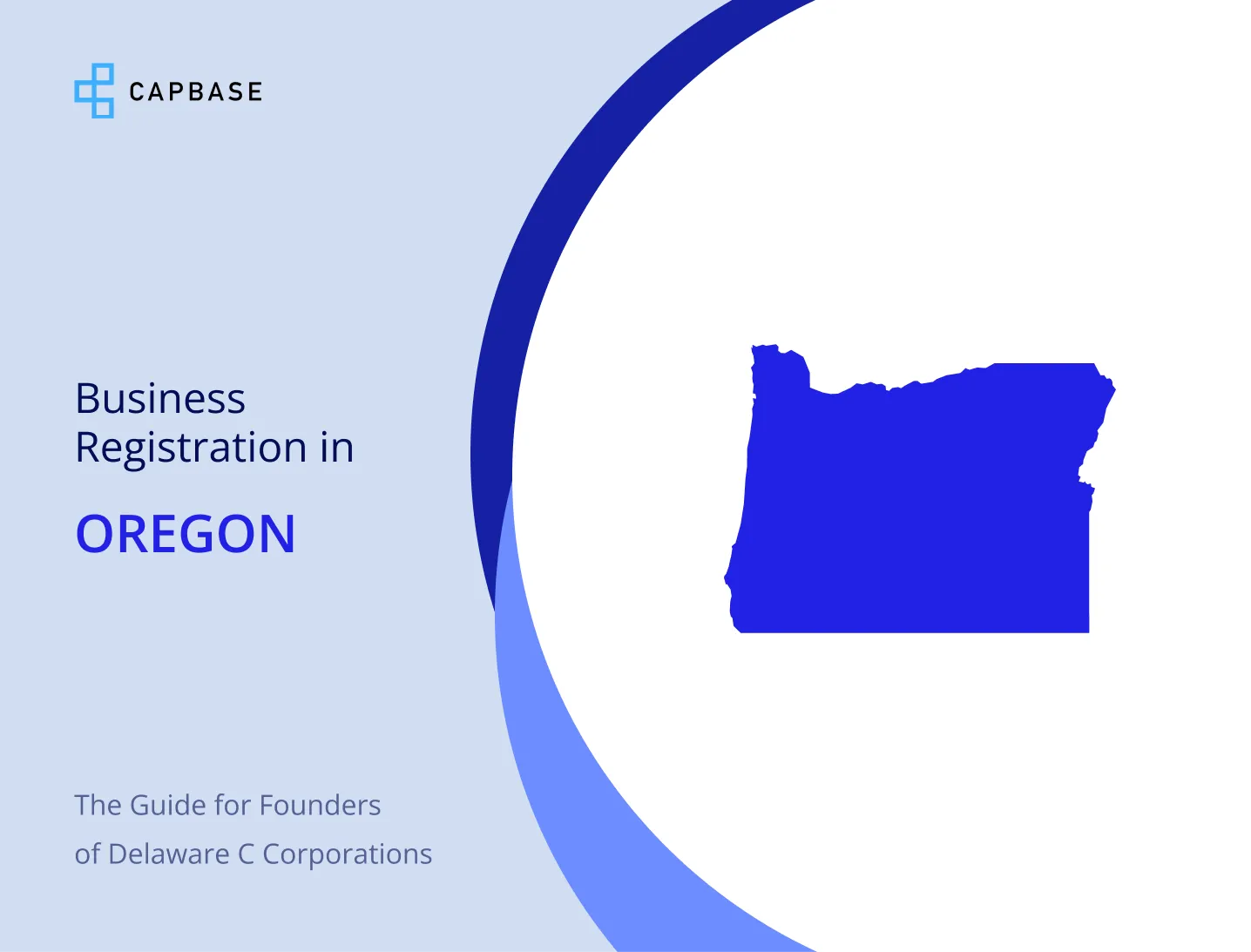
Doing Business in Oregon: Foreign Entity Registration for Startups & Corporations
 by Capbase Staff • 7 min readpublished September 28, 2022 • updated December 4, 2023
by Capbase Staff • 7 min readpublished September 28, 2022 • updated December 4, 2023
Related

Stay ahead of the curve
You’ll get actionable advice, comprehensive guides, interviews with founders, and more.
You'll probably incorporate a legal entity for your new business when you first start it. There are many to choose from, including limited liability companies, limited partnerships, nonprofit organizations, and S Corporations, but a C Corporation is probably the best choice of business entity if you're starting a startup and want to raise money or be able to sell the company more easily in the future. As for where you should form your C Corporation, there’s no better domicile than Delaware due to its extensive business case law and business-friendly regulations.
You can incorporate a Delaware corporation from (virtually) anywhere in the world, but let’s say you’re starting up in Oregon. Whether Oregon is your home state or you’re spinning up an office there, you need to register with the state if you meet the qualifications for “doing business” in Oregon. This article aims to explain the foreign corporation registration process so you’re ready to get set up in Oregon.
But first, how can you tell whether you’re legally doing business in Oregon?
When to register as doing business in Oregon
Delaware C corps—and all other business corporations formed outside of Oregon—are referred to as Oregon foreign corporations.
Unlike many other states, whose laws do not clearly explain what “doing business” is, Oregon law does have a positive definition of “doing business” in the state. According to the Oregon Secretary of State, a foreign corporation is considered to be doing business and must register with the State if the company:
- Has an office in the state
- A place of business, other than an office where affairs of the corporation are regularly conducted
- Employees or representatives providing services, such as accounting or personal services, to customers as the primary business activity
- Employees or representatives providing services incidental to the sale of tangible or intangible personal property, such as installation, inspection, maintenance, warranty, or repair of a product
- An economic presence through which the taxpayer regularly takes advantage of Oregon's economy to produce income
- A stock of goods
Meeting any of these criteria may require you to register your Oregon business with the state.
Additionally, Oregon law also gives examples of some business activities which are explicitly excluded from the definition of "doing business” in the state. These include:
- Maintaining, defending or settling any proceeding.
- Holding meetings of the board of directors or shareholders or carrying on other activities concerning internal corporate affairs.
- Maintaining bank accounts.
- Maintaining offices or agencies for the transfer, exchange and registration of the corporation's own securities or maintaining trustees or depositaries with respect to those securities.
- Selling through independent contractors.
- Soliciting or obtaining orders, whether by mail or through employees or agents or otherwise, if the orders require acceptance outside this state before they become contracts.
- Creating or acquiring indebtedness, mortgages and security interests in real or personal property.
- Securing or collecting debts or enforcing mortgages and security interests in property securing the debts.
- Owning without more real or personal property.
- Conducting an isolated transaction that is completed within 30 days and is not one in the course of repeated transactions of a like nature.
- Transacting business in interstate commerce.
Oregon sales tax
Unlike most other states, Oregon does not have a general sales tax on goods purchased in Oregon. This means that you do not need to register with the Oregon Department of Revenue to collect sales tax in the state.
How to register your non-Oregon business with the State of Oregon
- Select a business name. This doesn’t have to be the name you registered when incorporating in Delaware, but it can be. If the business name you’d like to use is already being used, you may register your business under an assumed name (also known as a DBA name or fictitious name).
- Fill out an application. You’ll need to file an Application for Authority to Transact Business to the Oregon Secretary of State along with a Delaware Certificate of Good Standing, which also acts as a Certificate of Existence for your company.
- Pay the filing fee of $275 to the Oregon Secretary of State.
- Submit your Application for Authority to Transact Business.
- Wait. Processing typically takes two to four weeks.
Once you’re approved to operate as a qualified foreign business in Oregon and receive your Certificate of Authority, you’ll need to comply with certain requirements.
Compliance as a Qualified Foreign Business in Oregon
Maintaining a registered agent and submitting your annual report/renewal are two requirements you must satisfy to stay in compliance and continue operating legally in Oregon. You will also be responsible for paying a corporate activity tax as well as corporate income and excise taxes.
Registered agent in Oregon
Your registered agent in Oregon is your point of contact with local authorities. If you don’t have a physical address for your company in Oregon, it may be advantageous to find a registered agent to receive state notices and service of process on your behalf.
Foreign corporations are required to have a registered office in Oregon. The office cannot be a P.O. box or other mailing address, rather it must be a physical address (e.g. the street address) of your registered agent or a licensed registered agent service.
Your registered agent will forward any important information, such as business mail, to you. There are a number of firms that contract out registered agents. Pricing for these services typically ranges between $50 – $100 per year.
Annual reporting and renewal in Oregon
Every year, you must file a statement with the State, updating any changes to the company address or the composition of the Board and officers. You’ll include info like:
The legal name of your business
- The name and address of your registered agent
- The names and addresses of board members, managers, and officers
The filing fee for the annual report/renewal is $275. Annual reports can only be submitted online.
Paying your corporation income and excise tax
Oregon has a corporate income and excise tax. This tax is similar to a corporate income tax because it is measured based on your corporation’s net income. For more information on filing and paying your corporation income and excise tax, please see the following guidance from Oregon’s Department of Revenue.
Paying your corporate activity tax
Oregon also has a corporate activity tax. This tax is imposed on businesses for the privilege of doing business in the state and is measured on a business’s commercial activity, which is the total amount a business realizes from transactions and activity in Oregon. For more information on filing and paying your corporation income and excise tax, please see the following guidance from Oregon’s Department of Revenue.
Hiring and paying employees in Oregon
When you hire a new employee in Oregon, federal and state laws require that you report new hires within 20 days of a new employee’s hire date. You can report your new hires online.
Your payroll provider should be able to take care of paycheck withholdings, but it’s up to you to register as an employer with the State and set up an online employer account.
For a comprehensive guide of your responsibilities, Oregon provides the following information.
The Easiest Way To Register Your Business In Oregon
You must keep track of a lot of moving parts in order to register your business in Oregon. Failure to file the correct forms, provide the correct information, or stay current on compliance laws can result in serious headaches.
Capbase makes it simple. When you incorporate a Delaware corporation through Capbase, we will generate the necessary information for you to register to do business in Oregon and keep you up to date on any required filings.
The compliance calendar in your Capbase account will alert you to upcoming fees, reporting, or other obligations, allowing you to keep your startup in good standing with Oregon state officials.

Written by Capbase Staff
Capbase is a team of designers, engineers, and business professionals spread across 6 time zones on 3 continents united by our passion for dogs, coffee, and great software.
Related
American Samoa Business Entity Registration for Delaware Corporations
Is your company doing business in American Samoa? Get an easy-to-follow explanation about what forms you’ll need, information about registration fees, filing deadlines, naming requirements, and more.
 by Capbase Staff • 7 min read
by Capbase Staff • 7 min readRegistering Your Startup To Do Business In West Virginia
Is your company doing business in West Virginia? Get an easy-to-follow explanation about what forms you’ll need, information about registration fees, filing deadlines, naming requirements, and more.
 by Capbase Staff • 7 min read
by Capbase Staff • 7 min readRegistering Your Startup To Do Business In Maine
Is your company doing business in Maine? Get an easy-to-follow explanation about what forms you’ll need, information about registration fees, filing deadlines, naming requirements, and more.
 by Capbase Staff • 7 min read
by Capbase Staff • 7 min read